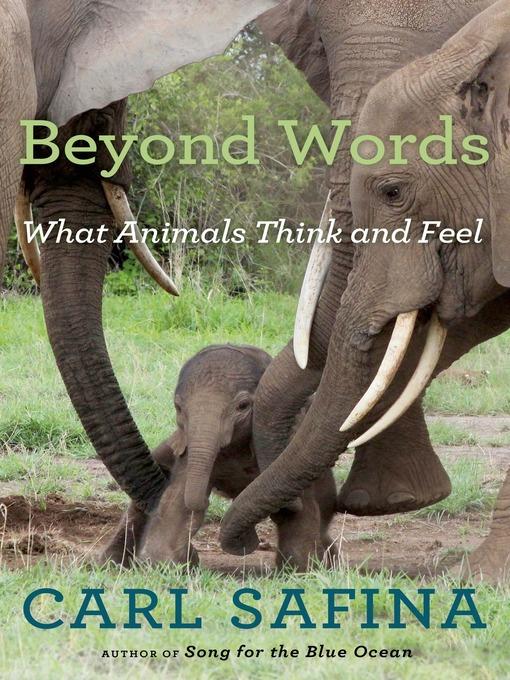
Beyond Words
What Animals Think and Feel
کتاب های مرتبط
- اطلاعات
- نقد و بررسی
- دیدگاه کاربران
نقد و بررسی

May 11, 2015
Considering the fascination human beings have with animal behavior, it’s little wonder so many books on the subject exist. Yet so many of these resources compare animal behavior with human behavior—apples to oranges—rather than comparing one type of animal behavior with another. Safina (Song for the Blue Ocean) chooses to concentrate on the latter approach to animal behavior, meeting up with animal behavior researchers in the field: first observing elephant families in Kenya, then the wolves of Yellowstone, and, finally, killer whale pods in the Pacific Northwest. In between his on-site adventures, Safina discusses the higher-intelligence characteristics of lemurs, chimpanzees, and domestic dogs, among others. In this mind-bending book, Safina takes the reader along with him on his adventures, enlightening and educating at each of his stops. Those interested in animal behavior, as well as anyone who has ever wondered about higher animal intelligence, will feel as if they’re right next to the author, learning along with him. B&w illus.

Starred review from June 1, 2015
Award-winning ecologist Safina (Nature and Humanity/Stony Brook Univ.; The View from Lazy Point: A Natural Year in an Unnatural World, 2011 etc.) disputes the dogma among scientists that forbids speculations about the "the inner lives of animals." As the author notes, "a young scientist is taught that the animal mind-if there is such-is unknowable." They are taught to always refer to animals as "it" rather than "who." Attributing emotions to animals is to commit the sin of anthropomorphism. Safina refutes this idea by examining the social behavior of primates, elephants, wolves, whales, and many others. "Not assuming that other animals have thoughts and feelings was a good start for a new science," he writes. "Insisting that they did not was bad science." To dissociate man from other animals is to deny the evidence. We recognize when animals are hungry, so why not admit "when animals seem joyous in joyful contexts, joy is the simplest interpretation of the evidence." The author cites experiments that demonstrate how electrical stimulation of the brains of animals and humans trigger similar emotional responses, and he based his examples on his personal observations of animals in the wild and discussions with experts with firsthand knowledge of them. For example, the matriarch in an elephant or wolf family depends on other adults for support, and they, in turn, depend upon her. Safina illustrates this with poignant descriptions of how the social lives of both adult and young animals are shaped by the interplay of individual adult personalities within the family. The author's chronicles of his observations of wild animals are captivating, but they also serve to make a larger point: why are people unwilling to admit that nonhuman animals also think and feel as we do? Safina suggests that perhaps it is "because acknowledging the mind of another makes it harder to abuse them." A profound, scientifically based appeal for recognition of the kinship of all living things.
COPYRIGHT(2015) Kirkus Reviews, ALL RIGHTS RESERVED.

May 15, 2015
Award-winning author Safina (nature & humanity, Stony Brook Univ.; The View from Lazy Point: A Natural Year in an Unnatural World) explores, through anecdotes and scientific information, nonhuman animals and their sense of self. He believes that animals have an inner life; that they can think and feel, experience joy and grief, and recognize and communicate with family and friends; and that they are capable of empathy, reasoning, cooperation, and deception, among many other attributes. Safina interviews and accompanies in the field the foremost researchers of the behavior of elephants, wolves, and killer whales, learning about these creatures' lifestyles and relationships and observing how they experience their lives (he also includes examples from the lives of dolphins, apes, monkeys, birds, and even fish to support his premise). Following families of elephants, packs of wolves, and pods of whales, Safina introduces us to individuals and their myriad relationships. He shares information on the species' status in the wild and the conservation challenges they face. VERDICT This well-researched book is a fascinating and thought-provoking investigation of different ways of viewing nonhuman creatures and their inner lives and is recommended for everyone who is interested in those beings and their behavior. [See Prepub Alert, 2/2/15.]--Sue O'Brien, Downers Grove P.L., IL
Copyright 2015 Library Journal, LLC Used with permission.

Starred review from July 1, 2015
Esteemed ecologist and superb writer Safina (The View from Lazy Point, 2010), recipient of MacArthur and Pew fellowships and a Lannan Literary Award, introduces us to the who animalsthose which, like our species, know who they are; they know who their family and friends are. They know their enemies. To illuminate the inner lives of some of these highly intelligent and socially advanced beings, Safina accompanies experts in the field and collects a treasury of captivating and affecting true animal stories. In Kenya, he is charmed by exuberant baby elephants and awestruck by the great matriarchs, discerning just how distinct each individual personality is and how each animal has close bonds to loved ones and specific roles in their communities as well as curiosity, valor, a sense of humor, empathy, memories, and capacities for problem-solving and leadership. The same holds for the powerfully expressive wolves he follows in Yellowstone and the smart and cooperative killer whales he watches in the ocean of the Pacific Northwest. With forays into neurology and diverse animal-behavior studies, Safina reveals that ours is just one of many powerful minds at work on Earth and that we share many profound traits with our fellow animals. By turns mesmerizing, thrilling, and tragic, Safina's enlightening inquiry into animal intelligence calls for a new, compassionate perspective before we unwittingly drive our precious animal kin into extinction.(Reprinted with permission of Booklist, copyright 2015, American Library Association.)

























دیدگاه کاربران